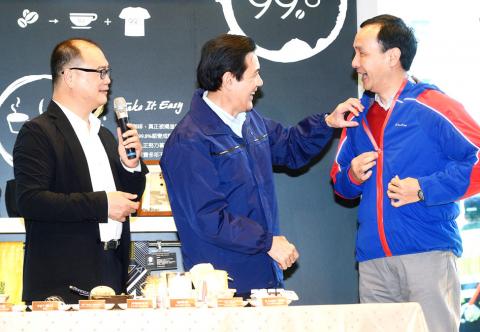President Ma Ying-jeou (馬英九) yesterday attributed the nation’s lagging behind South Korea and Singapore in signing free-trade agreements (FTAs) to obstruction from China, as he was urged to push for trade liberalization.
During a visit with New Taipei City Mayor Eric Chu (朱立倫) at Singtex Industrial Co in the municipality’s Sinjhuang District (新莊), Singtex president Chin Kuo-chin (陳國欽) called on the Ma administration to speed up negotiations over a trade deal with China under the cross-strait Economic Cooperation Framework Agreement (ECFA) and FTAs with other nations.
“No one wants to sign an agreement with Taiwan,” Ma said in response, adding, however, that many nations are interested in trade with the nation

Photo: Wang Min-wei, Taipei Times
“It is all because of the politics at play,” Ma said. “Therefore, we need to complete the signing of [subsequent agreements under the] ECFA to create room for negotiations with other nations over free-trade deals.”
Taiwan has lagged far behind South Korea and Singapore in this regard, Ma said.
As an export-oriented economy with a small domestic market, Taiwan needs to open itself up, he added.
“We cannot just close the door and feel complacent,” Ma said.
The number of nations that have established an FTA-like trade mechanism with Taiwan was brought to seven last year after trade pacts with New Zealand and Singapore were signed.
Previously, Taiwan held similar agreements with five diplomatic allies in Central America — Panama, Guatemala, Nicaragua, El Salvador and Honduras.
Although Taiwan — a WTO member — is entitled to sign trade agreements with other WTO members, the deals signed with New Zealand and Singapore came only after the ECFA was signed in 2010.
One of the reasons that Beijing did not interfere with the deals is believed to be that Singapore and New Zealand already have trade pacts with China, reports and analysts have said.
Under the ECFA, Taiwan and China in 2011 began reducing or eliminating tariffs on imports itemized in what is known as the “early harvest list,” while they agreed to continue negotiations on investments and trade in goods and services.
The Cross-Strait Bilateral Protection and Promotion Agreement took effect early last year. The cross-strait service trade agreement has been stalled in the legislature pending ratification since it was signed in July last year.
Recently resumed negotiations over an agreement on trade in goods had been hampered by a delay in ratifying the service trade agreement caused by the student-led Sunflower movement in March and April. The movement focused public anger on the government’s handling of what protesters called “backroom” cross-strait negotiations.
Taipei and Beijing have yet to begin talks over a proposed mechanism to settle cross-strait disputes, another ECFA follow-up agreement.

Taiwan is to commence mass production of the Tien Kung (天弓, “Sky Bow”) III, IV and V missiles by the second quarter of this year if the legislature approves the government’s NT$1.25 trillion (US$39.78 billion) special defense budget, an official said yesterday. Commenting on condition of anonymity, a defense official with knowledge of the matter said that the advanced systems are expected to provide crucial capabilities against ballistic and cruise missiles for the proposed “T-Dome,” an advanced, multi-layered air defense network. The Tien Kung III is an air defense missile with a maximum interception altitude of 35km. The Tien Kung IV and V

The disruption of 941 flights in and out of Taiwan due to China’s large-scale military exercises was no accident, but rather the result of a “quasi-blockade” used to simulate creating the air and sea routes needed for an amphibious landing, a military expert said. The disruptions occurred on Tuesday and lasted about 10 hours as China conducted live-fire drills in the Taiwan Strait. The Civil Aviation Administration (CAA) said the exercises affected 857 international flights and 84 domestic flights, affecting more than 100,000 travelers. Su Tzu-yun (蘇紫雲), a research fellow at the government-sponsored Institute for National Defense and Security Research, said the air

Taiwan lacks effective and cost-efficient armaments to intercept rockets, making the planned “T-Dome” interception system necessary, two experts said on Tuesday. The concerns were raised after China’s military fired two waves of rockets during live-fire drills around Taiwan on Tuesday, part of two-day exercises code-named “Justice Mission 2025.” The first wave involved 17 rockets launched at 9am from Pingtan in China’s Fujian Province, according to Lieutenant General Hsieh Jih-sheng (謝日升) of the Office of the Deputy Chief of the General Staff for Intelligence at the Ministry of National Defense. Those rockets landed 70 nautical miles (129.6km) northeast of Keelung without flying over Taiwan,

City buses in Taipei and New Taipei City, as well as the Taipei MRT, would on Saturday begin accepting QR code payments from five electronic payment providers, the Taipei Department of Transportation said yesterday. The new option would allow passengers to use the “transportation QR code” feature from EasyWallet, iPass Money, iCash Pay, Jkopay or PXPay Plus. Passengers should open their preferred electronic payment app, select the “transportation code” — not the regular payment code — unlock it, and scan the code at ticket readers or gates, General Planning Division Director-General Liu Kuo-chu (劉國著) said. People should move through the